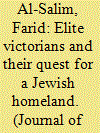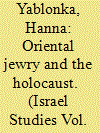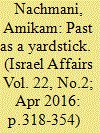|
|
|
Sort Order |
|
|
|
Items / Page
|
|
|
|
|
|
|
| Srl | Item |
| 1 |
ID:
113341


|
|
|
| 2 |
ID:
115353


|
|
|
|
|
| Publication |
2012.
|
| Summary/Abstract |
The term 'anti-Semitism' indicates how far the anti-Jewish literature of the late nineteenth and early twentieth centuries was charged with themes, figures, and stereotypes from contemporary discourses on the Orient. An increasing tendency to 'orientalise' the European Jews had raised questions about the supposed origin of the Jewish people in the Near East and its relationship to other - current or historical - peoples. Focusing on the Nazi racial scientist Ludwig Ferdinand Clauß, the article draws attention to the impact of Near Eastern anthropology, ethnology, and archaeology in the Age of Empire on modern anti-Semitism and sheds light on structural convergences and differences between colonial or 'Orientalist' discourses and anti-Semitism in general. With reference to the scholarly literature of the time, Clauß made a sharp distinction between 'Oriental' or 'Semitic' Arabs and 'Near Eastern' Jews. Thereby, the romanticised Arab Orient served as an antipole to a 'Nordic' Europe, and as such was finally able to advance to a positive alternative. The Jewish Orient, on the other hand, embodied a threatening ambivalence and contrariety, which from the very beginning precluded romanticisation and identification.
|
|
|
|
|
|
|
|
|
|
|
|
|
|
|
|
| 3 |
ID:
086178


|
|
|
|
|
| Publication |
2009.
|
| Summary/Abstract |
This article deals with one of the most dominant elements in Israeli national identity-the Shoah. The paper asks how the Mizrahim in Israel related to it, since for most of them it was a remote historical chapter. The answer is given through an analysis of three generations of Mizrahim-those who lived during the Second World War and immigrated to Israel during its formative years; their children, most of whom were born in the Jewish State and educated in the Israeli educational system; and their grand children. The first generation viewed the destruction of the European Jews with profound compassion, but felt that the Shoah was a chapter in the history of the European Jews. Their children attempted to connect, facing, to a large extent, resentment and alienation. Their grand-children already have the Shoah burnt in their souls-being an integral part of their self-definition as Israelis.
|
|
|
|
|
|
|
|
|
|
|
|
|
|
|
|
| 4 |
ID:
144673


|
|
|
|
|
| Summary/Abstract |
Various factors shape European and Muslim migrant relations; one of these is European‒Jewish and European‒Israeli precedents. Hitherto, this factor has not been thoroughly discussed. This article focuses on the use of recent and past histories, by all sides, when describing present and future relations between the European majority and Muslim migrant minority. This discourse often makes reference to European Jewry as a guiding precedent, as well as to Israeli Middle Eastern policies. As a result, a meaningful triangle has been formed, whose sides consist of Europeans, Muslim immigrants and Jewish communities. The shared issues between them include the painful record of European‒Jewish relations and its implications for the European‒Muslim encounter; the Holocaust; the European Right, its agendas concerning Jews, Muslim immigration and its surprising contacts with the State of Israel; European restrictions against Muslim and Jewish worship and religious rites; among others. Repeatedly, the Muslim issue in Europe is referred to as the Continent’s ‘new Jewish problem’. Moreover, the contemporary integration experience of Muslim migrants in Europe is compared to that of Jews in earlier ages.
|
|
|
|
|
|
|
|
|
|
|
|
|
|
|
|
|
|
|
|
|